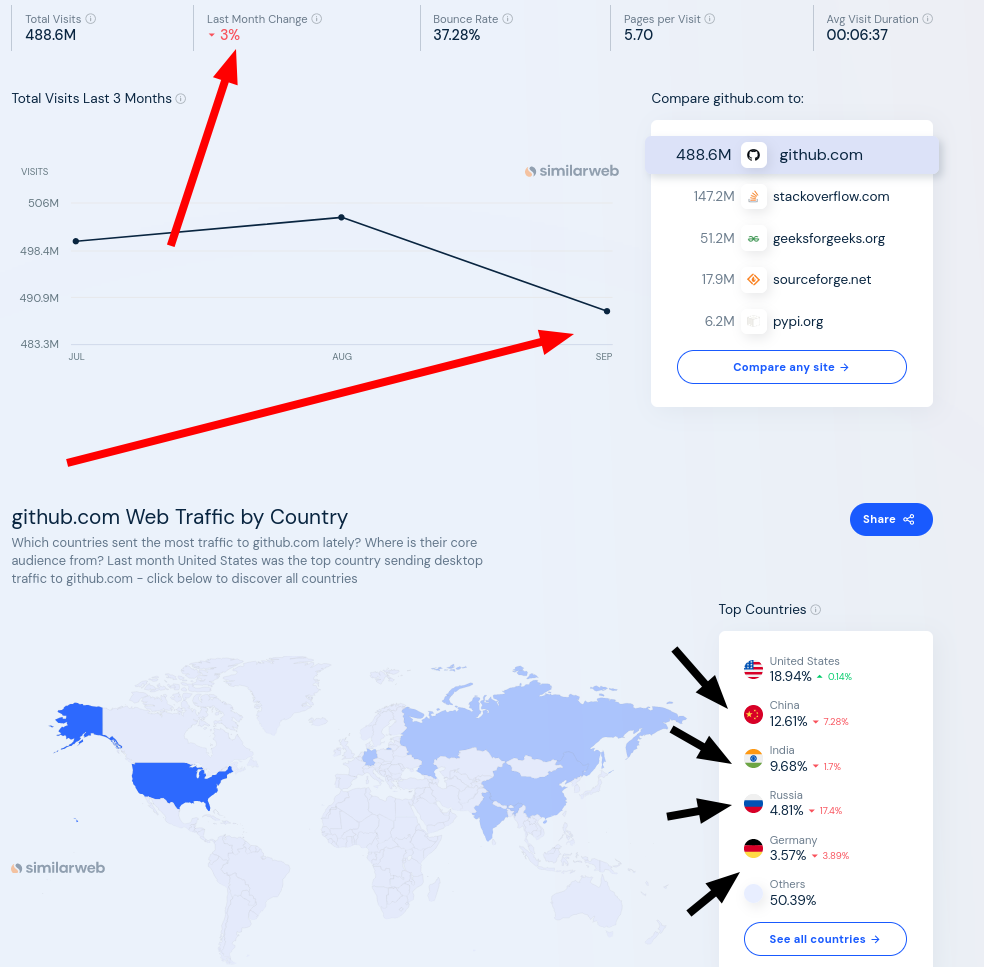Microsoft's GitHub is Losing Traffic, Based on an Extensive Web Survey, and Its Future is Uncertain
This latest snapshot shows a lot of red: (is Microsoft scaring away its "slaves"?)
SOMEBODY TOLD us over the weekend that GitHub has (and was having) issues. It's not hard to tell. Heck, the offices of GitHub were permanently shut down (not all of them) and many technical workers got laid off in several waves (they were pressured to sign NDAs about these layoffs, according to media reports we saw). Considering voluntary departures and people's retirement - not to mention workers whose "contract" (temporary) work simply reached its "expiry" (a loophole exploited a lot since 2020) - it's difficult to tell just how much smaller GitHub became in recent years. Did it reduce headcount by 20%? Did it reduce payable hours by 20%? Maybe more? Who knows...
Remember that Microsoft keeps close to its chest the operations and finances of GitHub (because it's embarrassing!), so we must rely on leaks and/or whistleblowers.
Almost exactly 2 years ago TechCrunch wrote about GitHub: "Four years after being acquired by Microsoft, GitHub keeps doing its thing" (this was the headline and principal supposition).
It is losing money, yes! Definitely! Lots of money lost! That's basically what GitHub always did. There's no real business model and "doing its thing" means deepening Microsoft growing debt (to fake some "growth"+), which exceeded 100 billion dollars. 6 years ago the MBAs' outlet tried to explain "Why Microsoft Is Willing to Pay So Much for GitHub" (which merely loses money; it's like Elon Musk offering to buy Twitter, which was very deep in debt and constantly losing money; the company is now worth less than its debt).
Someone reminded me that "[i]t's nearing the anniversary of the loss of GitHub to MSFT or was that in June of 2018? Either way, six years have gone since the exodus from GitHub. Revisiting stats on the exodus would be useful. Friedman was involved there. The finances are very suspect..."
As we already showed, citing Microsoft's very own statistics, a year after GitHub was bought many projects left and fewer projects than before were added to GitHub. Microsoft accidentally admitted this when it attempted to show off (about the pandemic's impact).
GitHub does not have a future, not a long-term future anyway. Microsoft now tries to "monetise" it with plagiarism-as-a-service (disguised as "AI") and it's instead getting sued, hence creating another crisis (e.g. causing GitHub's operational costs to increase even further).
GitHub (as a site and company) has not been around for many years, unlike UNIX. GitHub just lost lots and lots and lots of money, so many people rode the "free" hosting (allured by the false perception of cost-savings through outsourcing). Git will continue to exist and can prevail until something better arrives. Gitlab is deep in debt and is reportedly looking for an "exit" (a buyer*), so the business model certainly isn't there. The plan is to exercise control over developers and projects gullible enough to think the losses will continue and the companies are some kind of "charities". They're not. There was one rude awakening a few years ago when Gitlab said it would remove all "inactive" projects to save money (resulting in massive backlash and temporary reversal). █
_____
+ Measured in highly misleading terms in order to justify managers' bonuses. For instance, IBM uses its profit to buy new companies for their profits, giving the illusion of growing profits. Of course this is how IBM ends up over 60 billion dollars in debt, but nobody pays attention to that; just watch the profits that IBM is buying, dear Wall Street. This is a form of financial engineering.
* It's not merely the subject of speculation. Lots of media reported about it in recent months. There were active negotiations behind closed doors.

